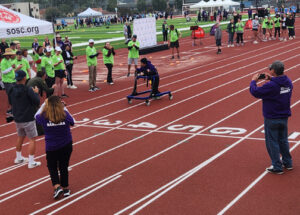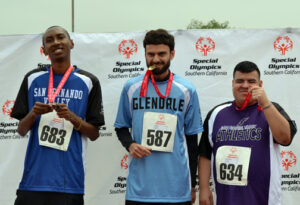
Credit: Ryan Jorge, Special Olympics Southern California
By Eliza PARTIKA
“Let me win, but if I do not win, let me be brave in the attempt.”
The oath of the Special Olympics was put into action on Sunday, April 20 as over 400 athletes competed in basketball, swimming, and track and field at the 2024 Special Olympics Glendale Spring Games.
Family and friends supported the athletes from the stands with some 200 volunteers working food and water booths, guiding athletes to and from the field, and cheering them on.
Kim Villa, Glendale Local Program coordinator said the Special Olympics is an opportunity for the community to see athletes as themselves, as “people who love to participate.”
“People, through the events of the Special Olympics, have begun to see [people with special needs] differently and instead of seeing them as people [who] can’t do something they really see what they’re capable of doing,” Villa said.
At 9 a.m., the Games began with the parade of athletes and speeches from Kelly Pond, president and CEO of Special Olympics California, and an introduction from Glendale Special Olympics basketball player Michael Leon. After speeches and the pledge of allegiance, athletes and families split off to watch and play their respective sports until 3 p.m.
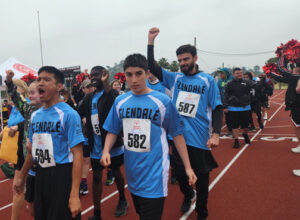
Like many of the athletes, Michael became involved with the Special Olympics in fifth grade playing a variety of sports, including basketball, which he played for five years. Michael provided support and advice to his teammates while off the field and, on the field, was proud to represent the Glendale games as its ambassador. While his team faced difficult challenges in this year’s games, Michael said the most important parts of the games are supporting each other and learning to play as one.
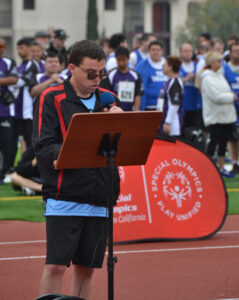
“Basketball is a team sport, all about working together, learning to play some moves more than others. Once you play together, you learn to move together. If you put in the effort to learn how to play together, your team will be good,” he said.
For the Leons, the Special Olympics has always been a family affair.
Michael’s father, basketball Coach Gabbi Leon, worked as a facilities manager for Special Olympics when Michael first began competing and eventually coached basketball. Michael’s entire family is involved with volunteering, coaching and managing. Coach Gabbi said he is proud that Michael has a place where he can play sports with others and learn how to collaborate with a team.
The same core group of basketball players has competed at Glendale’s Special Olympics for the last five years, Coach Gabbi said, with some new additions to the team. The Spring Games was their first competition of this season with at least one more on the horizon.
“When you come into a game situation like today, [the athletes] can see that they’re playing against a team of individuals that [they] haven’t met before. And they’re in a different uniform. And so then they start to understand the concepts of offense and defense in passing and things like that. So it’s a great learning experience,” Coach Gabbi said.
Cathy Leon, Michael’s mother and track coach for the Glendale team, said that while athletes don’t win every year, for her the Special Olympics is about watching athletes improve.
“Athletes get better every year because we don’t look at it as just a season; we look at it as a lifetime thing. It takes some athletes three years to finish the race. And it’s so exciting when they finish that race three years later. We don’t expect that they’re going to win it. Just trying to get better every time watching the relationships they form with each other, and how they love each other,” she said.
Track athlete Paul “The Flash” Kim, who began running track for Special Olympics in 2009, won gold in the 400 meter. Kim said he’s proud to train by himself, pushing to be stronger each season.
“I feel like I was born to be here. Special Olympics is like my second home where I get to feel free and be with my friends,” Kim said of winning gold. “I’ve been training my whole life.”
Russel Sayre, who is friends with and a teammate of Paul, started sports as a swimmer in New Mexico and started track and soccer when he moved to California in 2014. Sayre said he loves track because of how he is able to be with friends, train with early morning walks, and learn to move quickly.
“I think anything that involves fast moving the feet or legs I just enjoy. I met people who have been good friends of mine ever since I got put on the team. It’s nice to see people like me who have the same capabilities, if not more capabilities than me, who can do this and enjoy it,” Sayre said.
Sayre’s mother, Jayna Sayre, said she loves seeing Russel come out of his shell and use sports as a way to socialize.
“It’s a good opportunity for him to practice that. We’re proud that he works hard at anything he does, whether it’s the Special Olympics or his internship or job, or that whatever he’s doing, he just has full effort and commitment to it. He supports the other athletes, he wanders around and watches the other athletes compete,” she said. “We’re very proud of him for doing these things.”
The impact of Special Olympics extends to volunteers, who come to support athletes in a variety of ways: providing lunch, water and support on the field.
The Glendale High School honor drumline provided the beat underscoring the parade of athletes. Alyssa Cousac, drumline captain, said she was proud to represent Glendale High School.
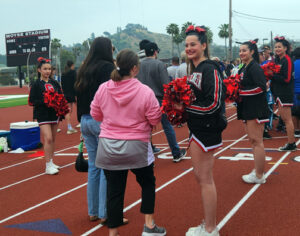
“I’m really proud to represent Glendale and to be here helping the community,” she said.
A former Special Olympics coach, former football coach, adaptive physical education specialist and AP teacher for 12 years, Dave Beard, who now teaches at Roosevelt Middle School as an inclusion in physical education teacher and volunteers for Special Olympics, said he loves coming to support the athletes after 17 years of watching them grow in their sport and as people.
Old and new athletes approached Beard to say hello and talk as he carted water or sandwiches across the field. Beard paused to watch and cheer on athletes in basketball and track where he knows many of the athletes and has seen them grow up.
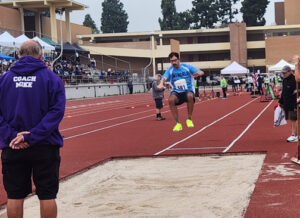
“It’s great seeing all the families. I’m really excited to see my kids grow. I’ve known some of them since they were like 4 years old, and [love] to see them now at 21, 22 years old and see how much they’ve grown and improved – to see how happy their families are. Exercise is so much more than just the simple thing of exercise. It’s about feeling better about yourself and then treating other people better,” Beard said.
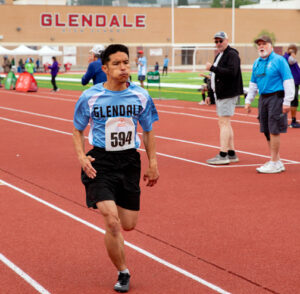
Photo by Kelly Baker, Special Olympics Southern California
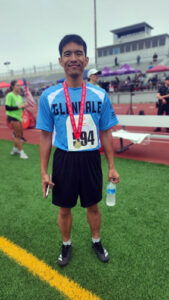
Photo by Eliza PARTIKA
Longtime volunteer Vanessa Blackwood summed up the Games as a place where you come for the sport and leave with so much more.
“That’s why we do this because it brings us joy; we’re here to help,” she said. “You leave here and you leave with a smile, no matter what kind of week you’ve had, your cup is filled when you’re here.”
